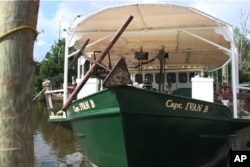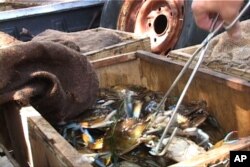Ask any of the fisherman along the Gulf of Mexico what they would rather be doing, and the answer won't be far off that of charter boat captain Jason Blanchard.
"Fishing," he says. "That was going to be my career...fishing."
Instead of fishing, Blanchard has been hired by the U-S Coast Guard to escort the media around the oil-stained marshes off the Louisiana coast. He and scores of other fishermen now work directly or indirectly for BP, the energy company blamed for the worst oil spill in U.S. history.
Fishing is more than a job along the coast. For many, like Randall Assavedo of Delacroix Island, it's a lifestyle handed down generation to generation.
"I've been an oyster fisherman my whole life. Until the oil spill," says Assavedo, a fifth-generation oysterman. "My Dad was a fisherman, an oyster fisherman. My grandpa was a fisherman. His daddy was a fisherman, before the ship channel was even dug. They lived without electricity. And his daddy - my great, great grandfather - was from the Canary Islands."
Like Blanchard, Assavedo desires nothing more than to get back to fishing the once oyster-rich marshes that make up the Louisiana coastline. But that's not going to happen for some time. "We can't even go out there to bed any oysters," he says. "You can't even put your dredges in the water."
For now, he's working for BP in St. Bernard parish, about a hundred kilometers from the spill. Like other coastal parishes, oil from a leaking pipe of the deep water oil platform has worked its way into St. Bernard's fishing waters.
"We've made some strides in containing the oil, certainly; we have a long way to go," cautions Cindy Brown, director of the Gulf of Mexico Program for the Nature Conservancy. In fact, Brown believes that the worst is still to come.
"Unfortunately this oil spill happened at a time of year - it couldn't have been a worse time of year," she says. "There were many species of fish that were spawning. Our birds were hatching. So I'd say life in the Gulf was at its most vulnerable state when the oil spill happened. So, we're very concerned about our species. In some cases we will have lost an entire year of productivity."
Not far from the exotically-named town of Cocodrie in neighboring Terrebonne Parish, a short cruise in the waters reveals the damage to the marshes. Crews in fishing boats, as well as coast guard vessels, are busy setting absorbent booms around the sensitive marsh areas. Some are even mopping up the oil that has crept in the tall grasses.
Pamela Manns, a U.S. Coast Guard Public Affairs Specialist, says that skimming boats that slurp the oil off the water's surface help, but they're only part of the strategy.
"The strategy for cleaning up the spill is to fight it off shore and if that doesn't work and it starts to come toward land, then use the boom defensively so that it directs the oil to the beaches and they can clean it off the beaches," says Manns. "And do whatever we can to protect the marshland because that's the most difficult area for us to clean off."
A temporary cap on the leaking well seems to be holding, and work on drilling relief wells continues. Still, even once the leak is sealed for good, it could be years before the environmental and economic damage is corrected.
"My wife has a seafood market in the Westwego shrimp market over there," says Raymond "Skipper" Melerine as he pulls in crab from the still-unaffected areas off Delacroix Island. "All of them just about shut down. I keep going, she sells my crabs out there. I manage to make a little extra money by doing that but you know overall the shrimping and everything is so hard to get."
Shane, working next to Melerine, pipes up. "You don't get the sale like you used to. You can see they are still scared to buy the seafood. You know they not going to eat like they normally do, but you can't sell what you normally sell since that happened you know."
Melerine says fishermen in the area, along with BP and local officials, are doing all they can to clean up the Gulf - and he remains hopeful about the near future. If, that is...and there are a lot of ifs.
"I think everybody be back to work next year, if we don't get a hurricane. If we don't get some kind of contamination of the seafood from the dispersants. That's everything that is probably happening right now. The testing of the seafood. So far they say they have no problems with it so I would say hey, it's not my call, it's there. But everything around here looks good. This is God's country, Delacroix Island."
A recent Coast Guard report estimates about five million barrels of oil spilled out into the Gulf of Mexico from the deep water rig. About half that amount has evaporated or biodegraded. More than a million barrels of oil has been burned or collected.
That still leaves over 250 million liters of oil in the water. Oil that's going nowhere fast.





